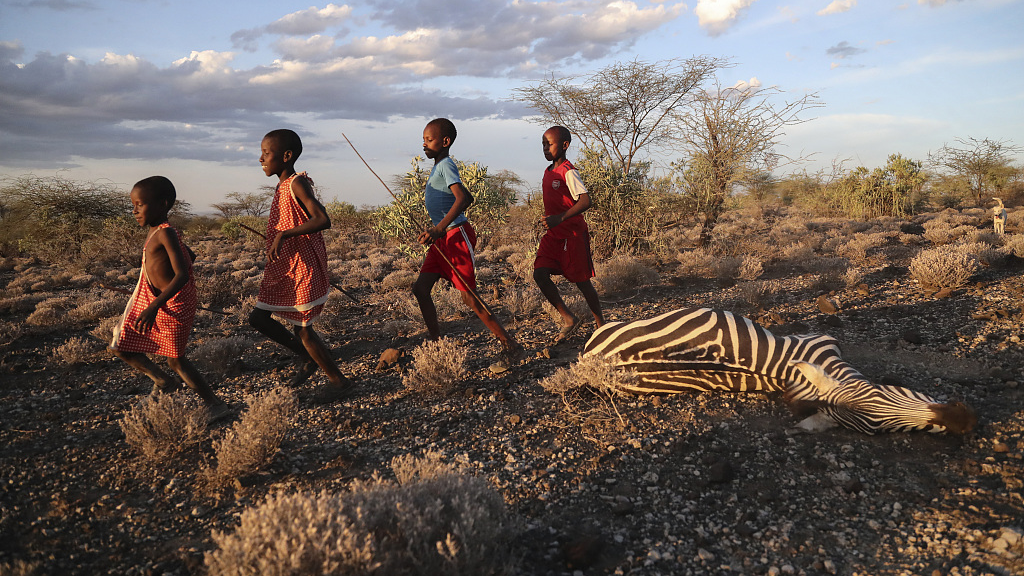
Children run past a zebra that died due to drought at Ilangeruani village, near Lake Magadi, in Kenya, November 9, 2022. /CFP
Children run past a zebra that died due to drought at Ilangeruani village, near Lake Magadi, in Kenya, November 9, 2022. /CFP
Editor's note: Lynette Okengo, a special commentator on current affairs for CGTN, is the Executive Director of the Africa Early Childhood Network. Elizabeth Lule, a special commentator for CGTN, is the Executive Director of the Early Childhood Development Action Network. The article reflects the authors' opinions, and not necessarily the views of CGTN.
At the conclusion of the first-ever Africa Climate Summit in September 2023, leaders issued the Nairobi Declaration of Climate Change and Call to Action that served as the basis for Africa's common position in the global climate change process to the 28th session of the Conference of the Parties (COP28) to the UN Framework Convention on Climate Change and beyond. While this is a significant step toward addressing the disproportionate impact of the climate crisis on the African continent, the participation of children has been minimal in climate change discussions.
The imperative to prioritize the needs of the youngest children who are the most vulnerable population in climate change discourses at regional and national levels was well captured in the children's declaration presented to H.E. Dr. William Ruto, President of the Republic of Kenya, and H.E. Moussa Faki, Chairperson of the African Union Commission.
As early childhood development (ECD) advocates, our collective efforts should include advocacy strategies and actions that address the unique needs of young children in climate action plans. Evidence shows that young children are biologically less equipped than adults to handle the effects of environmental shocks such as heat, pollution, flooding, displacement and forced migration, and diseases intensified by the effects of climate change.
Exposure to climate change-related crises such as drought and famine exacerbates malnutrition, contributing to stunting and increasing vulnerability to other health shocks. Global data show that more than 1.7 million premature deaths among children under five are caused by pollution and toxic substances annually.
Research shows that children born in 2020 will experience, on average, twice as many wildfires, 2.8 times as much exposure to crop failure, 2.6 times as many drought events, 2.8 times as many river floods, and 6.8 times more heatwaves across their lifetimes, compared to a person born in 1960.
Despite evidence showing that children are among the most at risk of the impacts of climate change, they remain an afterthought in climate financing, mitigation and adaptation strategies, and service delivery needed to help them survive and adapt to environmental crises.
According to a recent report by the United Nations International Children's Emergency Fund (Unicef), only 2.4 percent of global climate funding is child-responsive, while 98 percent of children in African countries face high or extremely high risk of the impacts of climate change.
In Africa's poorest communities, these threats are exacerbated by the lack of access to high-quality services such as water, sanitation, hygiene, health, nutrition, and education. This calls for the need to intensify advocacy to ensure that issues of the youngest children are integrated into climate change financing discussions and actions at global, regional, and national levels. Specifically, more resources and attention should be directed to climate crisis hotspots in Africa, where strong physical and ecological effects of climate change intersect with large populations of poor and vulnerable communities.
The evidence is startling, and the crisis is getting worse. We cannot afford to keep talking about how children will bear the brunt of the climate effects but only pay lip service when it comes to responding to their needs. The failure to actively respond to the unique needs of Africa's young children in global, regional and national climate action plans will have devastating effects in the region for generations.

A general view at UNFCCC COP28 Climate Conference in Dubai, United Arab Emirates, December 1, 2023. /CFP
A general view at UNFCCC COP28 Climate Conference in Dubai, United Arab Emirates, December 1, 2023. /CFP
As ECD advocates and technical experts, the Africa Early Childhood Network and the Early Childhood Development Action Network are committed to building a strong network of partners to put our children front and center in climate change discussions and decision-making, including financing, policies, systems, and ECD programs and practice, to address the disproportionate impact of climate change on young children.
We call for concerted efforts to prioritize ECD in regional and national plans to address the underlying causes of climate change and environmental degradation. We also need to invest in building climate-resilient care, health, and education systems to help children not only survive but thrive. Specifically, we call for collaborative efforts on:
First, increasing investments in the nurturing care of young children, particularly good health and nutrition, early learning opportunities, responsive care, and security and protection, and ensuring policies and practices are green and climate-smart.
Second, building evidence through research and evaluation to inform policy and investment decisions for leveraging ECD as a tool to build climate resilience; and financing civil society to implement locally led and child-sensitive actions on climate change.
Third, investing in greening education to build climate resilience within communities starting at early childhood to help adapt to and mitigate the impacts of climate change; empowering children as agents of change by ensuring their voices and views are heard and seen.
We were excited to see at the Africa Climate Summit that children were given the chance to voice their concerns on the issues affecting them and to be included in the discussions with key stakeholders.
Globally, the recently released General Comment No. 26 explicitly states children's right to a clean, healthy, and sustainable environment and calls on governments to take action to address the adverse effects of environmental degradation and climate change that infringe upon those rights. Now, we must turn these words into concrete actions.
As we turn our attention to COP28 and the first Global Stocktake, we face a growing urgency to address the pressing issues of climate change and the sobering reality of how far behind we are on the goals we have set. It is with this urgency in mind that we call on state parties to come together to prioritize young children in climate action and to develop clear, practical, and immediate steps to ensure a sustainable and secure world for generations to come.
(If you want to contribute and have specific expertise, please contact us at opinions@cgtn.com. Follow @thouse_opinions on Twitter to discover the latest commentaries in the CGTN Opinion Section.)



